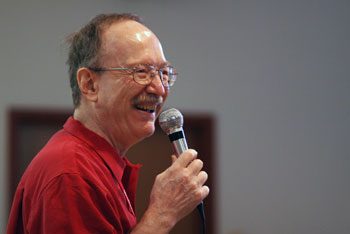I have always treasured the corollary to Socrates' famous dictum that "the unexamined life is not worth living." The corollary: the unlived life is not worth examining.—Professor Emeritus Vic Powell H'55
 In 1962, full of youthful arrogance and self-indulgence, I gave a Chapel speech titled “The Wabash Failure.”
In 1962, full of youthful arrogance and self-indulgence, I gave a Chapel speech titled “The Wabash Failure.”
“There is another story called ‘The Wabash Success,’” I said 48 years ago. “But I have only 10 minutes to remind you that some of us fail all the time and that all of us have the possibility of failure some of the time.
“How does Wabash fail? I will attempt to outline three areas of failure—the failure of the students, the failure of the faculty and the combined failure of our ideas about Wabash tradition.”
I went on to say that students—preoccupied with future careers—failed to confront the realities of their immediate lives while “self-enclosed” in a comfortable academic environment. Faculty failed to relate old ideas to student existence, and the College failed to apply its venerable traditions to a modern world.
“In a sense these failures are also our challenges,” I concluded. “…a challenge to make great demands on ourselves, to pile up difficulties and duties, a challenge to defend with courage and with understanding those values which have made us what we are.”
Later that same year, I gave a Commencement speech and stood under a tree near the Chapel with my diploma, contemplating what to do next. I had been a successful student from whom much was expected, but had been rejected for the Phi Beta Kappa Society after failing to complete two independent study projects. I had received a second in comps and recalled Bert Stern asking me ironically, “How does it feel to have a second-rate mind?” Norm Moore approached me with similar irony to say, “We would have liked to give you an award, but you didn’t fit any of our categories.” Most of my classmates were headed to graduate school. I had lined up a night job in a local plastics factory and had vague plans to “write,” perhaps even finish those study projects.
The following month, with the prospects of a future draft looming ahead, I drove from Crawfordsville to Baltimore in a precarious old Studebaker and talked to one of my father’s (Wabash Class of 38) colleagues at the Army Intelligence School. The next day, I called my brother Dave (Class of 65), asked him to retrieve my few belongings (mostly books) at the DAR House, and boarded a train to Fort Jackson, SC as a new enlistee in the US Army.
The years followed inexorably. I succeeded as an investigator, failed as a spy and barely escaped court-martial as a soldier. Subsequently I failed to honor a marriage contract, achieved some success as a newspaperman, and then resigned to anonymity. I started an entertainment business that ended in virtual bankruptcy after four years and never found an academic home as an independent scholar. With the exception of a 41-year-old marriage, my Wabash life and the subsequent years could be condensed under the general rubric of “failure.”
My father, a self-made man from the Depression era, never quite understood my choices.
“You started out as a young man with the greatest potential I ever saw,” he wrote once. “Your mother and I then saw you throw away the opportunities that I would have given my soul to have had at your age…I have also felt for years that you lacked some kind of balance, call it maturity, call it good judgment—common sense—whatever. It was difficult otherwise to account for the fact that you threw away your opportunities so recklessly. A chance for a distinguished college career—thrown away; a chance for a continued academic career—thrown away; a chance for a distinguished military career—thrown away.”
I’ve infrequently fantasized about returning to Wabash to revisit the subject of failure—not something colleges usually encourage alumni to explore. We like to celebrate “success” and inspire our young men to greatness as part of what we still call “The American Dream.”
The point of this essay is not to confess mistakes, remember a disappointed father or lament missed opportunities. There’s another side to the story. The great Persian poet Rumi reminded us that opposites occupy hidden spaces together. Within every “failure” is a “success” and vice versa. It all depends on your scale of measurement.
The great Vic Powell confirmed this notion when he wrote me 20 years ago:
“Your career is glorious testimony that the quality of a liberal education is not tested by checkbooks. I have always treasured the corollary to Socrates’ famous dictum that ‘the unexamined life is not worth living.’ The corollary: The unlived life is not worth examining. I am persuaded that you are ‘living your life.’ If sometime in your varied careers you strike it rich, I am sure the College will be happy to share your bounty. In the meantime, I will count you among the successes of liberal education.”
Thanks, Vic. I don’t feel so bad. If I ever return to speak in the Chapel about failure, my conclusion will be the same. Contrary to accepted wisdom, the difficult path often contains the best rewards. Success is easy. Failure contains the challenges that make us better men.
C. Earl Arnett is a Baltimore-area journalist, author, music entrepreneur and multimedia producer.
 In 1962, full of youthful arrogance and self-indulgence, I gave a Chapel speech titled “The Wabash Failure.”
In 1962, full of youthful arrogance and self-indulgence, I gave a Chapel speech titled “The Wabash Failure.”